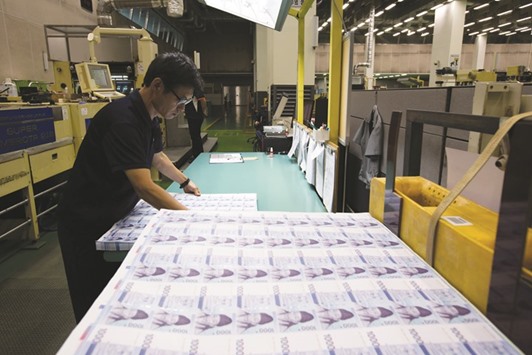Even investors who’ve been buying Asia’s most battered currency this year say the won’s recent gains are unlikely to last.
South Korea’s currency dropped against all its regional peers in the first two months, before recovering to become Asia’s best performer in March as commodities rebounded and China, its biggest overseas market, said there’s no need to devalue the yuan.
The problem is that while the won’s rally from a five-year low in February is extending, a record slump in exports shows no signs of abating, and national champions Samsung Electronics Co and Hyundai Motor Co say they anticipate a difficult year amid global turbulence.
The won’s status as a proxy for the yuan is also a burden as Chinese growth slumps and authorities in Beijing consider a tax on currency trading. The won will weaken 6.3% to 1,240 per dollar by December 31, completing its first three-year slide in two decades, according to a Bloomberg survey of strategists.
“I am bullish in the short term, or for about three months,” said Rajeev De Mello, who oversees about $10bn as the head of Asian fixed income at Schroder Investment Management in Singapore, and who bought the won in recent weeks via non-deliverable forwards and shorter-dated domestic notes. “Medium-term concerns are still there, such as slower growth, lower trade and strong ties with China.”
Here’s the good news: The won has rallied 6.4% in March, data compiled by Bloomberg show, erasing Asia’s biggest drop in the first two months and its worst start to a year since 2009. It climbed 0.9% to close at 1,162.44 per dollar in Soul yesterday, and is up 0.9% in 2016 after sinking to 1,245.13 on February 29, the weakest since June 2010. China’s yuan has strengthened 1.1% this month and is 0.2% stronger for the year.
Global funds turned net buyers of Korean assets this month, pouring about $3.9bn into the nation’s equity and debt, resulting in inflows of $1.3bn for the year. The won is also supported by a current-account surplus that the central bank estimates at $98bn for 2016, compared with its earlier projection of $93bn.
And options traders have become less bearish. The premium traders pay for three-month contracts giving them the right to sell the won over contracts allowing purchases has dropped to 1.30 percentage points from this year’s high of 2.66 reached on February 12, data compiled by Bloomberg show.
Australia & New Zealand Banking Group recommends buying the won against the Taiwan dollar using three-month non-deliverable forwards following its slide earlier this year, according to Khoon Goh, a Singapore-based senior currency strategist at the lender. Credit Agricole CIB also favors a similar trade via 12-month forward contracts. The won was “oversold” given that South Korea is one of the stronger Asian economies, said Gary Yau, a Hong Kong-based emerging-markets strategist at the French lender.
But the outlook for Asia’s fourth-largest economy hasn’t improved since the central bank cut its 2016 economic growth and inflation forecasts in January as China’s instability roiled global markets. The Bank of Korea last week held its benchmark interest rate at a record low of 1.5% for a ninth month, with one board member calling for a cut to 1.25%, leaving Governor Lee Ju Yeol seeking to quell speculation about further reductions by saying they might have limited benefit and that the risk of outflows remains a concern. The BoK will next review its forecasts at its April meeting.
Samsung Electronics faces another difficult year after a 2015 plagued by economic turbulence and volatile exchange rates, Chief Executive Officer Kwon Oh-Hyun said in a letter to shareholders this month.
The company said in January it expects slowing demand for smartphones and more global economic headwinds this year. Hyundai Motor posted first drop in monthly sales in January and expects the market situation to remain difficult this year amid China’s slowdown and uncertainties in emerging-market currencies.
China’s economy grew 6.9% in 2015, the slowest pace in 25 years, and the government is targeting a 6.5% to 7% expansion this year.
The most bearish won forecasters predict pain. Morgan Stanley projects a drop to 1,350 per dollar by the year-end, Royal Bank of Canada sees a decline to 1,310 and Rabobank Group to 1,308. Geopolitical risks stemming from North Korea’s threat of an attack following its recent missile and nuclear tests are also “a very short-term negative” for the won, according to Schroder’s De Mello.
Goldman Sachs Asset Management said it added bets against the won, in a note dated March 11.
A week earlier it had pulled out of short positions on the currency. State Street Global Advisors expects buyers to emerge at levels between 1,230 and 1,250, according to Ng Kheng Siang, its Singapore-based head of Asia Pacific fixed income.
“None of the fundamental problems that caused the selloff last time have been resolved,” said Michael Every, the Hong Kong-based head of financial markets research for Asia Pacific at Rabobank. “The only thing that stabilised things have been the Fed backing away from interest-rate hikes for now and China actively pretending it isn’t going to devalue its currency when everyone knows it is.”

An employee inspects sheets of South Korean 1,000 won banknotes at the Korea Minting, Security Printing & ID Card Operating Corp factory in Geyongsan. The won climbed 0.9% to close at 1,162.44 per dollar in Soul yesterday.
